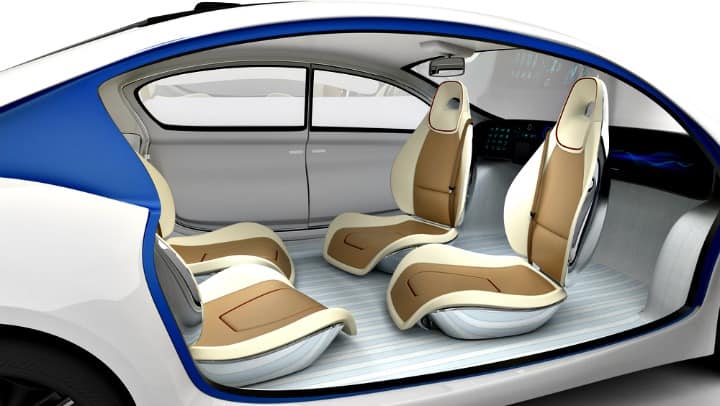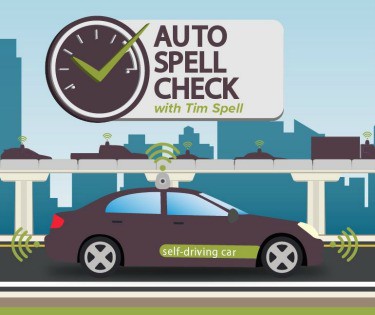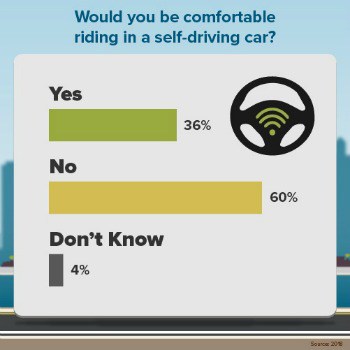Survey: Men, Millennials Most Likely to Embrace Self-Driving Cars

Your Uber arrives — without a driver. Do you hop in or hit “cancel ride” as quickly as possible?
A nationwide survey recently conducted by insuranceQuotes.com posed that question and more, shedding light on consumer attitudes and predictions surrounding self-driving vehicles in 2018. The study revealed skepticism and enthusiasm toward autonomous vehicles, with men and Millennials expressing greater willingness than women and older generations to embrace this driving technology.
 According to the survey, a majority of American adults (60 percent) are not comfortable riding in a self-driving car, compared to just 36 percent who are. Further, while 56 percent feel less safe sharing the road with autonomous vehicles, only 31 percent feel safer. And when it comes to taking a self-driving taxi or ride-hailing service, most Americans (61 percent) would refuse the ride.
According to the survey, a majority of American adults (60 percent) are not comfortable riding in a self-driving car, compared to just 36 percent who are. Further, while 56 percent feel less safe sharing the road with autonomous vehicles, only 31 percent feel safer. And when it comes to taking a self-driving taxi or ride-hailing service, most Americans (61 percent) would refuse the ride.
Acceptance of auto technology lags
Self-driving vehicle technology is relatively new, and we have not yet reached a point of widespread public acceptance. Still, the potential impact of autonomous vehicles on the automotive industry — and society as a whole — is tremendous.
RELATED: What Driverless Auto Features Are Available Today?
Automated technologies offer a new possibility, says Mark Rosekind, administrator, National Highway Traffic Safety Administration. It’s the possibility that crashes can be prevented from ever occurring. “At NHTSA in particular, our primary focus is always on how we can save more lives and reduce crashes on our roadways.
“There are clearly potential social benefits from automated vehicles. These technologies hold enormous promise for providing mobility to millions of Americans without easy access to personal transportation — that includes the elderly and people with disabilities. Automated technologies can help cities increase capacity without pouring a single new truck load of concrete. These vehicles could save energy and cut air pollution, as well.”
There is curiosity nationwide about self-driving vehicles, albeit colored with hesitancy, and even fear. The self-driving car feels futuristic and foreign to many drivers. However, some drivers are warming to the idea of autonomous vehicles. Specifically, the data shows that of American adults, younger males are most comfortable with the concept.
Generational breakdowns show that more than half (54 percent) of 18-to 34-year-olds would get into a self-driving Uber.
 Of those aged 18 to 34, 55 percent would be comfortable riding in a self-driving car and 45 percent feel safer sharing the road with such vehicles, compared to 36 percent and 31 percent for the general population, respectively.
Of those aged 18 to 34, 55 percent would be comfortable riding in a self-driving car and 45 percent feel safer sharing the road with such vehicles, compared to 36 percent and 31 percent for the general population, respectively.
The gender breakdown exposes a similar trend: Men (43 percent) are more likely than women (31 percent) to get into a self-driving Uber, 44 percent of men would feel comfortable in a self-driving car, and 38 percent would feel safer sharing the road with these vehicles — compared to just 29 percent and 24 percent of women, respectively.
CHECK OUT: Why Technology Will Change the Sport of Auto Racing
A majority of people (65 percent) think that self-driving vehicles in the United States will eventually make up 50 percent of total vehicles on the road, and most (56 percent) also believe that, within the next 50 years, autonomous cars will be widely used in the U.S. and statistically safer than human-driven cars.
Consistent with the demographic pattern, men (61 percent) are more likely than women (52 percent) to believe this, and 18- to 34-year-olds (68 percent) are more likely to share this belief than any other age group.
Optimism high for future of autonomous cars
Results revealed a particularly high degree of optimism among Americans who think self-driving cars will make up more than 50 percent of vehicles in the next 50 years.
For instance, a vast majority (71 percent) of these individuals believe self-driving vehicles will be widely used in the U.S. and statistically safer than human-driven cars in that time period.
Men (76 percent) in this group are more likely than women (66 percent) to share the belief, and 18- to 34-year-olds (77 percent) are more likely to agree than any other age group.
With technological progress, more Americans will eventually approve of — and perhaps even adopt — autonomous vehicles, as manufacturers, insurers and lawmakers adjust in accordance.
“Not since the switch from horse and buggy to the personal car a century ago have we seen new technology that may fundamentally alter the way people get around on our roads,” Rosekind says.
Methodology:
This study was conducted for insuranceQuotes.com via telephone by SQL Server Reporting Services. Interviews were conducted among a sample of 1,007 respondents from Feb. 21-25, 2018 (which was prior to the March 18 fatality incident in Arizona involving a self-driving Uber). The margin of error for total respondents is +/-3.58 percent at the 95 percent confidence level. All data are weighted to represent the adult U.S. population.

